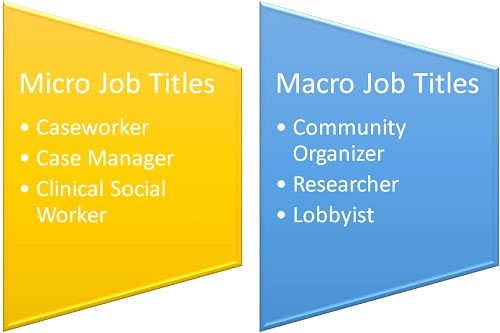In addition to the many different areas of social work practice, there are two primary areas of focus in the field: micro and macro. There are numerous career paths in both micro and macro roles, and both types of social workers make a difference, but they do so in different ways. Whether you want to work with individuals and families or in larger-scale social justice and advocacy roles determines whether micro or macro social work is a better fit for your career.
The Direct Service Roles of Micro Social Work
Micro social work refers to social work roles that revolve around assisting individuals. Also called direct service roles, micro social work positions involve working with clients – individuals and families. Most of what the average person thinks of as the practice of social work – such as working in child and family services or putting individuals in touch with programs and resources that help with housing and other issues, fit into this category of direct service.
Within micro social work, there are many different job functions. Nonclinical roles in micro social work might include caseworker and case manager jobs. These roles, particularly in the industry of individual and family services, are often available to candidates who acquire a Bachelor of Social Work (BSW) degree, the Council for Social Work Education (CSWE) reported.
Clinical social worker jobs often fall into the micro social work category, as well. A clinical social worker has a graduate education that qualifies the practitioner to diagnose and treat mental health disorders and to provide counseling and other forms of therapy for clients who need assistance coping with difficult situations in their lives. Licensed clinical social workers (LCSW) are mental health professionals who may work in private practice or in counseling and mental health facilities. Before you can become a clinical social worker, you need to earn your Master of Social Work (MSW) degree.
One distinction between the BSW and MSW degree is that the BSW is a generalist education only, while the MSW covers both generalist and specialist knowledge, according to the CSWE.
Advocacy and Public Policy Matters in Macro Social Work
Macro social work is the opposite of micro social work. Instead of focusing on the small-scale work of social work practice with individuals, macro social work emphasizes the large-scale efforts of advocacy, social justice and public policy. Macro social workers don’t have that fulfilling experience of helping individual clients improve their situations and their lives, but they use their passion for social justice and their knowledge of social work theories and practice to work for improvements in social service programs and social policies.
IMAGE SOURCE: Pixabay, public domain
Some job titles you might hold in macro social work include community organizer and program developer. At institutions of higher education, you might work as a researcher or a professor. High-level roles in this field include lobbyist, which often requires an MSW degree, but the United States Bureau of Labor Statistics reported that a BSW degree is sufficient for some macro social work roles in policymaking, legislative advocacy and the development of social service programs.
The changes brought about by macro social workers affect a large number of people – much larger than the number of clients a single social worker, even one with a large caseload, can assist – but that impact is not as personal or relationship-based.
Where Mezzo Social Work Fits Into the Field
Not every role or function within social work will fit neatly into either micro or macro social work. These two opposing focuses can be thought of as the two ends of a spectrum, and in between them is what’s called mezzo social work. Mezzo, which literally translates to “medium,” “middle” and similar concepts, refers to social work practice that falls in between direct service with individuals and indirect service involving policy.
Generally, mezzo social work is the name for practice that involves a lot of work with communities and other groups. A social worker who works in school, business and other organizational settings might be classed as a mezzo social worker, or at least, some of his or her job responsibilities might fall under this category.
There’s often overlap between different fields of social work. For example, a clinical social worker might lead a weekly support group in addition to providing clinical services to individuals – and might even be involved in some lobbyist and policymaking functions.
Additional Resources
What Can I Do With a Social Work Degree?
What Should You Know When You Interview for a Job With a Degree in Social Work?
What Should You Know When You Interview for a Job With a Master’s Degree in Social Work?
How Advanced Does My Degree in Social Work Need to Be to Get a Good Job?


